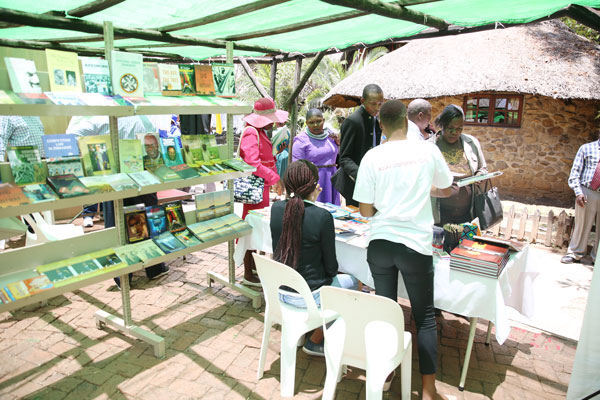
I was shopping around for a poetry publisher almost 10 years ago when a guidebook reliably advised me that there are more people who write poetry than those who read it, and more people who read poetry than those who buy it.
The storyboard with Stan Mushava

This, coming from Salt Publishing, a devoted midwife of the genre, wrapped a wet blanket around my schoolboy ambition. I would either become a Romantic writer-tramp, starving for what I believed in like Dambudzo Marechera, or hold down a decent nine-to-five.
By the time Salt stopped publishing single-author poetry collections, citing an unfriendly market, in 2013, I had reasonably confined my hopes to Zimbabwe, but here too, most publishers were only interested in prose. I would never raise a bride price from writing rhymes.
Poetry was dead — six iambic feet under internet culture. Wise men at university wrote its obituaries in books such as The Hatred of Poetry; obscure poets blamed God for sending them to a digitally distracted generation and pragmatic ones repurposed their craft into novels, spoken word and ghost-writing.
But then, Instagram poets Rupi Kaur, Nayyirah Waheed, Lang Leav, Warsan Shire and others made poetry pop again. Kaur’s self-published poetry collection, milk and honey, has sold over 2,5 million copies worldwide since its 2014 release. The India-born 25-year-old counts A-list celebrities among her Instagram followers.
The rumours of poetry’s death were greatly exaggerated. It is commercial again, if it ever was before. Hip-hop has Chance the Rapper, a Soundcloud spitter who railroaded his way atop charts and awards without a major-label formula. Poetry has Kaur, a disruptive model that young poets can fasten to and refuse to attend their genre’s much-remarked funeral.
Problem is, Kaur’s outselling of Homer as the world’s most read poet does not sit well with the gatekeepers. To hear critics say it, Kaur and the young, mostly female, internet-savvy upstarts killing it on Tumblr, Instagram and Amazon, are amateurs captivating an impressionable mob.
- Chamisa under fire over US$120K donation
- Mavhunga puts DeMbare into Chibuku quarterfinals
- Pension funds bet on Cabora Bassa oilfields
- Councils defy govt fire tender directive
Keep Reading
Whether poetry can be resurrected by the internet, the medium blamed for the death of all culture, is a subject for conspiracy theories. With bare-bones and occasionally pseudo-profound lines that make no demands on the readers’ intellect — “don’t mistake salt for sugar if he wants to be with you he will it’s that simple” and typical self-help shibboleths — Kaur easily plays into what The Antichrist of Silicon Valley, Andrew Keen, called the “cult of the amateur”.
Her words are ready-made for viral applause, seldom to be digested. Not even her immediacy, vulnerability and honesty — qualities usually praised in art — have charmed the university gatekeepers protecting the integrity of the craft. She has even been compared to Donald Trump, the manipulator-president who leans into the internet’s gut to shore up his clout.
Except that her politics is progressive rather than post-truth. Her poetry sizeably addresses love, sex, race, self-love, and abuse and dysfunction in relationships in a way that is equal-parts personal and universal. Whatever Kaur lacks in technical build, she makes up for with an aura of authenticity. Her simple lines are felt, as though unmediated.

The lack of cultural refinements appears to be a statement and much as the naked noodles are a metaphor; an insistence on feeling trumping technique. She tells Entertainment Weekly in an interview that her poetry resonates because it addresses real experiences in a time when people are media-saturated but detached from themselves.
“So this poetry on this medium which we’re always plugged into is almost like looking into a mirror. And it gives people space to suddenly do that inner reflection, which I think is a big reason for why it’s moving the way that it is. And I think that’s absolutely incredible. Poetry is amazing, and it should be mainstream, and I hope that it can only move in that direction more and more,” Kaur says.
Giovanni spotlights her for potentially cashing in on the real-life struggles of other women floating in an era of explosive outrage. “In an age when increasing attention is being paid to narratives of female trauma — particularly those communicated in a confessional vein — it can easily lead to the exploitation and commodification of those who experience said trauma.”
Ultimately, Giovanni’s critique seems bent on pinning her down to a demographic, a sort of post-colonial “othering” many artistes will frown at.
However, it is not hard to understand why Kaur has been flagged for plagiarism. Her art does not show much intellectual and technical investment. Instagram poets are self-confessed non-readers.
Their insistence on working in feelings that are all too share without stylistically expanding the canon puts them in a position of recycling banalities. Whether internet culture has killed or resurrected remains to be fully debated.
If Christopher Okigbo and TS Eliot were to come back to life, and did not tone down their technically varied esoterica, would they qualify as the hottest Instagram poets? As search-friendly algorithms and trending headlines reconfigure art forms, it is interesting to witness the age-old arm-wrestling of commerce and culture.
Feedback: [email protected]











